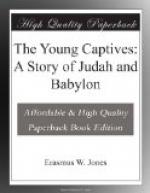It cannot be expected, on an occasion like the present, that all scholars will exhibit precisely the same amount of ability and cultivation. While all may give satisfaction, some, I trust, will even excel. Those who shall at this time give the clearest proof of ripe scholarship, shall, according to agreement, be permitted to remain at the palace, and minister in the presence of the king, with the prospect of promotion as the fruit of faithfulness. I trust there are no unpleasant feelings to arise from the final result of this day’s exercises. True, there may be some disappointment among both parents and scholars; but let not the king be grieved by witnessing any signs of displeasure on the countenance of young or old; for, hitherto, no partiality hath been permitted in any of our councils. Those whom the king promotes must therefore be promoted on the strength of their own worth and merit.
“My worthy and noble friend, Ashpenaz, will now commence the examination; after which, if I think it expedient, I may ask a few questions myself.”
Ashpenaz then, according to direction, commenced the examination, the king, in the meanwhile, earnestly facing the students, and paying particular attention to every answer, and the source whence it proceeded. After an examination of one hour, the king gave to Ashpenaz a signal, by which he understood that he might dispense with any further questioning.
The king then, as he had previously intimated, became the examiner. Being somewhat astonished, as well as delighted, by the perfect ease with which the youths of Judah answered every question, he purposed, within himself, to make a further trial of their skill, by propounding questions to the school which were far more difficult to answer than those asked by Ashpenaz. The reader is already aware that the king was one of the ripest scholars within the empire, and, therefore, was fully prepared for the undertaking. The first problem was directed to Shagoth. Shagoth colored, and, in endeavoring to answer, stammered out something which the king could not understand. The same question was directed to Apgomer. Apgomer, with steady voice and correct emphasis, answered; and it was pronounced to be correct. The next question was directed to Scribbo. He, greatly alarmed at the result of the other question, became confused, and gave no answer. The same question was directed to Daniel, and was promptly answered, with marked ease and great clearness. The next was directed to a young student who sat in the vicinity of Shagoth, but it was not answered to the satisfaction of the king. The same was directed to Hananiah, and the answer was such as to astonish the examiner. Another perplexing question was directed to a young student, a resident of the city; but it was of too profound a nature for the young man to answer. The king having asked the same question of several without receiving an answer, at last directed it to Azariah. The young Hebrew hesitated—it




